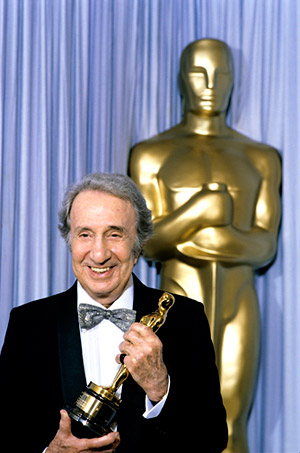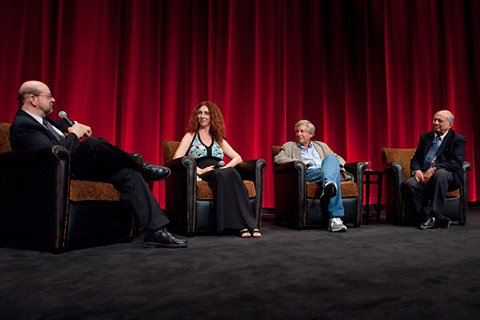

  |
|
|
||||||||||||||||||||||
|
FMS FEATURE... September 29, 2010 Alex North Centennial Academy tributes composer of such groundbreaking scores as Streetcar, Spartacus, Virginia Woolf  Alex North accepting an honorary Oscar at the 58th Annual Academy Awards in 1986. Several clips from North-scored films and a panel discussion preceded a full-length screening of The Misfits (1961) – North's first collaboration with director John Huston – which starred Clark Gable and Marilyn Monroe in their final screen performances, plus Montgomery Clift in one of his last, from an original script by Arthur Miller. Film-music historian Jon Burlingame was host and moderator for the event. Burlingame guided the audience through key excerpts from four North classics: A Streetcar Named Desire (1951), Viva Zapata! (1952), Spartacus (1960) and Who's Afraid of Virginia Woolf? (1966), each illustrating a different aspect of the North musical style (jazz, Mexican folk idioms, modernist music, and the concept of "playing against the picture," respectively). Joining him onstage for a 20-minute discussion of the composer's life and career were North's eldest son Steven North, a producer who hired his father for two of his own films (Shanks and The Last Butterfly); composer Laurence Rosenthal (Becket, The Miracle Worker), who knew North and also emerged from a background in the New York theatre; and Dr. Sanya Henderson, author of the biography Alex North, Film Composer.  (Left to right) Journalist and film-music historian Jon Burlingame, Alex North biographer Dr. Sanya Henderson, producer Steven North (son of Alex North) and Oscar-nominated composer Laurence Rosenthal. A special element of the evening was a seven-minute piece produced by Ric Romo, who assembled various quotes from a 1986 NBC News interview that North gave just prior to receiving his honorary Academy Award (the first ever presented to a film composer for his body of work) and augmented them with additional film clips including The Rose Tattoo, The Rainmaker and Cleopatra, and footage of the Oscar ceremony itself. Burlingame opened with a 1986 quote from director Huston: "He is the first composer of my choice in motion pictures. I venture to say this openly so that he may better appreciate the extent and depth of my gratitude. Many scenes in pictures I have made would seem listless, lifeless even, without his musical comment – but with it, spring to life and take their place among the best-remembered of my work." About the landmark jazz score for Streetcar, Burlingame drew laughter from the audience when he revealed that "North's music was cited as excessively 'carnal' by the Legion of Decency when they looked at this movie and, in their zeal to protect the American public from any thought of sex on the big screen, demanded cuts and changes. North's music was only reinstated when Kazan's original cut was restored decades later." North wrote "Unchained Melody" for a low-budget prison movie, Burlingame noted, adding that the composer "wound up with no fewer than four top-10 records by different artists – and that was long before it became a hit all over again in the 1990 movie Ghost." North's variety of 1950s credits also included a ballet for Leslie Caron in Daddy Long Legs, the theme for TV's prestige anthology Playhouse 90, and "an entire series of scores for movies based on works by such towering American literary figures as Tennessee Williams, William Faulkner, Carson McCullers and Arthur Miller," including The Rose Tattoo, The Long Hot Summer, Member of the Wedding and The Misfits. Burlingame said that North "thought outside the box" for Spartacus, applying modern music techniques to a story of Roman oppression from 2,000 years earlier. And, he pointed out, "he also created one of the great love themes in cinema history, for the characters played by Kirk Douglas and Jean Simmons – gentle, warm, intimate. It's a theme that went on to further fame in a jazz rendition by pianist Bill Evans..." He cited North's later credits, including such TV projects as the four-hour documentary Africa and the 12-hour miniseries Rich Man, Poor Man, the latter of which won North an Emmy. His other films with Huston included Wise Blood, Prizzi's Honor, Under the Volcano and The Dead. And the diversity of North's work was cited including 1980s scores for Dragonslayer, Carny and Good Morning Vietnam. In introducing The Misfits, Burlingame suggested that the audience pay special attention to the mustang roundup scenes in the film's final half-hour. "Variously rhythmic, powerful and unsettling, it's a virtual ballet," he said, adding that while "some thought this an unconventional choice, like the best film music it works both as dramatic accompaniment to the images and as pure music on its own." Also attending the event was North's younger son Dylan North, and cinematographer Haskell Wexler, who shot Who's Afraid of Virginia Woolf? for director Mike Nichols. Ellen Harrington served as producer for the Academy. Burlingame will host a two-hour radio program on the career of Alex North Oct. 24 on Los Angeles' KUSC-FM and www.kusc.org. ©2010 The Film Music Society |
Search
Past Features
Feature Archives
|